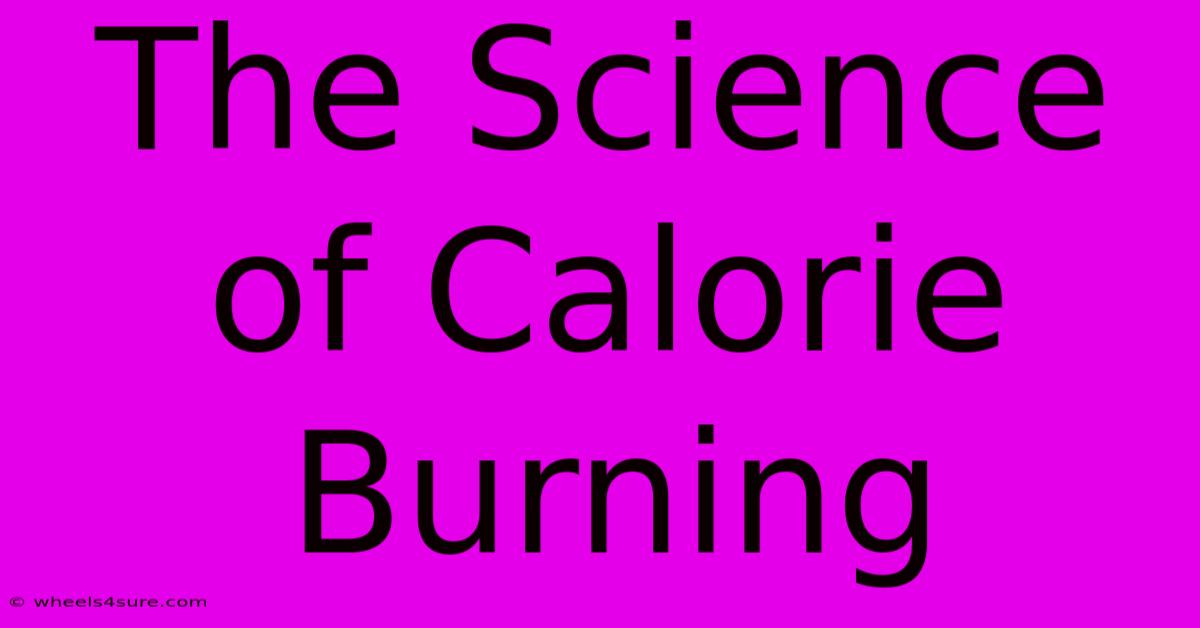The Science Of Calorie Burning

Table of Contents
The Science of Calorie Burning: Understanding Your Body's Energy Expenditure
Understanding how your body burns calories is key to achieving your health and fitness goals. It's not just about hitting the gym; it's about understanding the intricate science behind energy expenditure. This article delves into the fascinating world of calorie burning, exploring the various factors that influence it and providing you with actionable insights.
What are Calories and Why Do We Need Them?
Calories are units of energy. Our bodies need calories to perform all their functions, from breathing and digesting food to exercising and thinking. These calories are derived from the macronutrients we consume: carbohydrates, proteins, and fats. Each macronutrient provides a different number of calories per gram:
- Carbohydrates: 4 calories per gram
- Proteins: 4 calories per gram
- Fats: 9 calories per gram
Your daily caloric needs depend on several factors, including your age, sex, weight, height, activity level, and metabolism.
The Three Components of Calorie Expenditure
Your total daily energy expenditure (TDEE) is comprised of three main components:
1. Basal Metabolic Rate (BMR):
This is the number of calories your body burns at rest to maintain basic functions like breathing, circulation, and cell repair. Your BMR accounts for the largest portion of your TDEE, typically around 60-75%. Factors influencing BMR include:
- Age: BMR naturally decreases with age.
- Sex: Men generally have a higher BMR than women due to higher muscle mass.
- Body Composition: More muscle mass leads to a higher BMR.
- Genetics: Your genes play a role in determining your BMR.
2. Thermic Effect of Food (TEF):
This refers to the calories your body burns digesting, absorbing, and processing the food you eat. TEF accounts for a smaller portion of your TDEE, typically around 10%. Protein has the highest TEF, followed by carbohydrates, and then fats.
3. Activity Energy Expenditure (AEE):
This is the most variable component of your TDEE and represents the calories you burn through physical activity, including exercise and non-exercise activity thermogenesis (NEAT). NEAT encompasses everyday movements like walking, fidgeting, and standing. AEE can significantly impact your TDEE, potentially increasing it substantially depending on your activity level. Increasing your NEAT is a powerful way to boost calorie burning without necessarily spending hours at the gym.
Factors Affecting Calorie Burning Beyond the Basics
While BMR, TEF, and AEE are the primary components, other factors significantly influence your calorie expenditure:
- Muscle Mass: More muscle burns more calories, even at rest. Strength training is crucial for increasing muscle mass and boosting your metabolism.
- Hormones: Hormonal imbalances can affect metabolism and calorie burning.
- Sleep: Insufficient sleep can disrupt hormones that regulate metabolism.
- Stress: Chronic stress can increase cortisol levels, potentially leading to increased fat storage.
- Genetics: Genetic predisposition plays a role in metabolism and body composition.
Optimizing Your Calorie Burning
To maximize your calorie burning, consider these strategies:
- Incorporate Strength Training: Build muscle to boost your BMR.
- Increase Your NEAT: Find ways to be more active throughout the day. Take the stairs, walk during your lunch break, or stand up regularly.
- Prioritize Protein: Increase your protein intake to elevate TEF.
- Get Enough Sleep: Aim for 7-9 hours of quality sleep per night.
- Manage Stress: Practice stress-reducing techniques like meditation or yoga.
- Stay Hydrated: Drinking plenty of water can aid in metabolism.
Conclusion: It's More Than Just the Numbers
Understanding the science of calorie burning empowers you to make informed choices about your health and fitness journey. Remember that it’s a complex interplay of factors, and focusing on building a healthy lifestyle – rather than solely on calorie restriction – is crucial for long-term success. By combining a balanced diet, regular exercise, and healthy lifestyle habits, you can optimize your calorie burning and achieve your goals.

Thank you for visiting our website wich cover about The Science Of Calorie Burning. We hope the information provided has been useful to you. Feel free to contact us if you have any questions or need further assistance. See you next time and dont miss to bookmark.
Featured Posts
-
Hardik Pandyas Net Worth Source Of Income Breakdown
Apr 07, 2025
-
Dia Mirzas Age And Her Inspiring Fitness Routine
Apr 07, 2025
-
You Cant Take My Daughter A Testament To Love
Apr 07, 2025
-
The Age Of Gyanendra Shah A Critical Assessment
Apr 07, 2025
-
The Impact Of Elon Musk Real Time Net Worth Tracking
Apr 07, 2025
